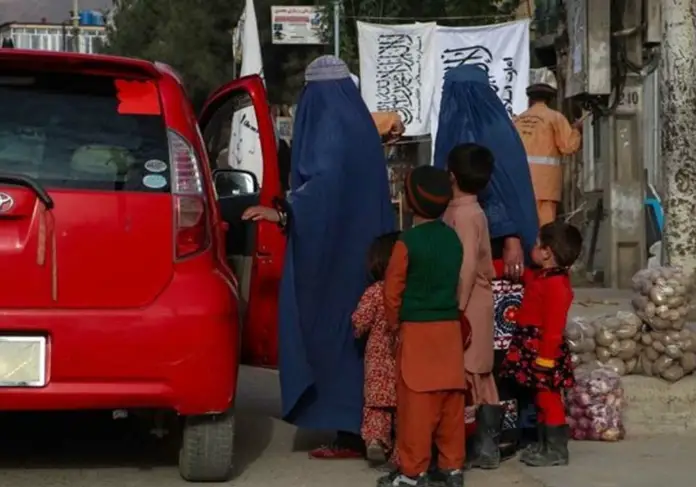It has been more than two years since the return of the Taliban to power in Afghanistan and the nation continues to plunge further into a profound human rights crisis, marked by the stark entrenching of gender apartheid. This oppressive ideology, rooted in a distorted interpretation of Islamic jurisprudence, has catalyzed a systematic dismantling of the rights and freedoms of Afghan women, creating an atmosphere of fear and despair. The international community must not turn a blind eye to this unfolding tragedy, as it poses a threat not only to the women of Afghanistan but also diminishes any chances of a bright future for the country at large.
The term “gender apartheid” aptly describes the Taliban’s approach to women’s rights. With echoes of their oppressive rule in the 1990s, the Taliban’s draconian interpretation of Shariah law seeks to confine women to a restricted, subservient role. This manifests itself in the denial of education, employment and participation in public life. Women are being pushed to the margins of society, silenced and rendered invisible, reinforcing an insidious gender-based hierarchy. Highlighting the gravity of the situation, a survey by Gallup this month showed that “nearly all the country’s women continue to suffer.”
Denying opportunities to women is a self-inflicted impediment to a country’s success. When women are sidelined from education, employment and public life, a nation forfeits the vast potential, creativity and diverse perspectives this half of the population can contribute. Gender equality is not just a moral imperative, it is an economic and social necessity. Studies consistently show that empowering women leads to increased productivity, innovation and economic growth.
By shackling women’s potential, a country limits its ability to thrive, stifles progress and perpetuates cycles of poverty and inequality. True success requires unlocking the full spectrum of human talent and ensuring opportunities are boundless for all. And no country needs to fully exploit all opportunities and resources more than Afghanistan, where poverty remains a pervasive challenge, exacerbated by decades of conflict and instability.
Perhaps the most damaging consequence of the Taliban’s return is the erosion of educational opportunities for Afghan girls and women. More and more schools are closing their doors to female students and teachers every month. In March 2022, the Taliban prevented 1.1 million secondary school-aged girls from attending school indefinitely. The Taliban have also banned women from attending university. According to UNESCO, 80 percent of school-aged Afghan girls and young women are currently out of school. This is 2.5 million people.
The Taliban’s oppressive policies extend beyond denying women access to education; they also seek to strip away economic autonomy. Women who were once active contributors to the workforce are now facing the threat of unemployment and economic marginalization. This deliberate economic oppression not only exacerbates poverty but also perpetuates a cycle of dependence that further entrenches gender-based discrimination, ensuring women are lifelong aid recipients and fully dependent on men for even the most basic necessities of life.
The imposition of strict dress codes, restrictions on movement and limitations on public appearances constitute a suffocating web of constraints on Afghan women. The freedom to express oneself, to move through the world with agency, is a basic human right. The Taliban’s attempts to curtail these freedoms amount to a violation of the very essence of what it means to be human and they are fundamentally against the tenets of Islamic doctrine.
Perhaps most distressing is the culture of impunity that the Taliban’s resurgence has fostered. Reports of violence against women, forced marriages and even executions remain unaddressed, creating an environment where perpetrators go unpunished. This culture of silence not only emboldens those who seek to subjugate women, but it also perpetuates a cycle of fear that stifles any form of dissent.
In the face of this unfolding tragedy, the international community must stand united in condemning the Taliban’s blatant disregard for human rights. Diplomatic pressure from nations that the Taliban view favorably and targeted interventions are essential tools for holding the Taliban accountable for their egregious actions. The voices of Afghan women must not be silenced; they must resonate across international platforms, demanding justice, equality and the restoration of their basic human rights.
Moreover, humanitarian organizations and neighboring countries should collaborate to provide support for Afghan women who find themselves trapped in this quagmire. This includes offering refuge, educational opportunities and avenues for economic empowerment to mitigate the adverse effects of the Taliban’s oppressive policies. The Taliban are heavily dependent on international aid. Such assistance should come with clear quantifiable conditions to dilute their policies toward the marginalization of women and girls.
The gender apartheid and human rights crisis in Afghanistan demands urgent and concerted action from the international community. The repressive policies of the Taliban are not only a threat to Afghan women, but to the principles of justice, equality and humanity that we collectively hold dear. It is time for the world to stand up to this gross violation of human rights and work toward a future in which every individual, regardless of gender, can live a life free from oppression and fear.
To witness Afghanistan emerge as a resilient, self-reliant nation, it is imperative to compel the Taliban to reverse their policies toward women. There is no alternative path toward building a strong, stable and confident Afghanistan.
Dr. Azeem Ibrahim is the director of special initiatives at the Newlines Institute for Strategy and Policy in Washington DC. X: @AzeemIbrahim
DISCLAIMER: This article originally appeared in Arab News. Minute Mirror is republishing this piece for its readers; and purely for non- commercial purposes. This views expressed in this article belong on the writer and do not necessarily reflect editorial policy of Minute Mirror.







